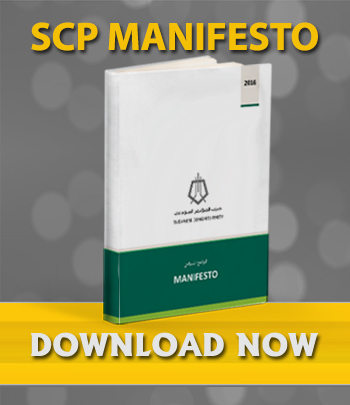APPROACH
The Sudanese situation presents a number of issues and hypotheses that require deep contemplation in order to find solutions, or, brainstorming in order to draw inspiration from the Sudanese way of thinking to address these core theoretical issues and a way of expressing the problems posed by them. This program therefore, highlights the following theoretical issues:The Sudanese situation presents a number of issues and hypotheses that require deep contemplation in order to find solutions, or, brainstorming in order to draw inspiration from the Sudanese way of thinking to address these core theoretical issues and a way of expressing the problems posed by them. This program therefore, highlights the following theoretical issues:
4.1 Intellectual approaches:
The party is open to all kinds of global scientific knowledge in its analysis of social phenomena and the nature of conflicts and crises within the Sudanese state, taking into account the characteristics that distinguish Sudanese society from others without submission or intellectual subordination to them. The party also takes into account the valuable contributions that have been drafted as a pathway for the movement for its future development through the methodology of cultural analysis, as well as debate between the center and the peripheries using various tools leading to a deeper understanding of the nature of the conflict within the Sudanese state since its inception. The party also encourages and opens its doors to continuous development of the tools and methods of scientific analysis through an ongoing dialogue within its corridors and between the party and the masses of the Sudanese people of different walks and affiliations.
4.2 Independence:
Is the ability to think and act from a place of freedom. The freedom of the individual arises from his freedom from ideological constraints and patterns of narrow-minded thinking and other forms of ideological, intellectual and cultural doctrines.
Independence in this sense, is linked to our position on ideological and cultural prejudices, which transcend the shackles of reason from opinions and perceptions that shape the views of man of himself and others and is a positive response to the current situation and its problems.
4.3 Sudanese National Identity:
Sudan is composed of a number of different cultures and ethnicities. The Sudanese speak a number of Sudanese languages & dialects and practice a number of different religions, The State in the Sudan was built on pre-capitalist societies, in terms of religions, cultures and ethnicities, and varied in terms of their historical development. The Sudanese differ greatly on their understanding of their national identity. “Are they Arab? or African? or a mixture of this and that? Or are they pure Sudanese?” These differences have been a big contributor to the outbreak of civil wars, and the state has continued to regress ever backwards backward as it argues over its national identity.
Our perspective on the issue of Sudanese nationalism is based on our recognition of the fact that we are a diverse people; culturally, ethnically and religiously, and therefore we are a people who, at present, cannot chose our cultural identity other than arbitrarily. Any choice we make means excluding those who do not see themselves represented by that choice. Therefore, the most satisfactory answer is to ensure coexistence between all the peoples of the Sudanese state under a constitutional umbrella that supports diversity and abandons the idea of a monolithic identity so we can rise up from our current circumstances and move towards a future identity which is diverse and cannot be reduced to a rigid definition or classification.
4.4 Citizenship:
Citizenship requires recognition that all groups and peoples in the Sudan are Sudanese citizens by origin and that the laws of Sudan must treat them with total equality through equal opportunities on the basis of the right to preserve the privacy of their identities, histories and heritage within the framework of the Sudanese State. It is also the right of all groups and peoples to participate fully in the decision-making process of the Sudanese state and away from harmful concepts of the losing minority and the winning majority.
Citizenship means that rights are built upon the ties between the nationality of the citizen and the State, meaning that the state will not grant any citizen greater privileges on the basis of their religion, race or gender, with the exception of positive discrimination in favour of marginalized groups to transition them out of their lesser circumstances.
4.5 Social justice:
The historical disparities that were created by the policies of the Sudanese state led to the creation of wide disparities amongst the population of the one country, that has resulted in the current crises and tragedies that our nation suffers from, which requires a lot of work to cure these disparities and for this reason, The Sudanese Congress party, within its program, has adopted the concept of social justice as an a primary and a fundamental value that reflects the aspirations of our people for a dignified life.
Our view of the concept of social justice is aimed at eliminating social, economic and cultural disparities and adopting policies that favor the poor and the most marginalized groups in order to achieve equality and apply the principle of equality of opportunities amongst all people and their differing groups irrespective of religion, color, race, culture or gender.
4.6 Pluralistic Democracy:
This program is based on an innovative vision for a national renaissance project based on Sudanese heritage and global human experience and to harmonise it with the conditions and circumstances of the local community. This vision aims to create new groundwork based on pluralism, the economic, social and cultural dimension of civil and political rights, and the concepts that offer the greatest possible freedoms to citizens whilst protecting the greatest diversity possible and enriching the diversity and recognizing the different other and respecting their right not only to their difference but to express this difference in accordance with the institutional safeguards in force not only through the law but also at the political and social level.
These visions are a theoretical and practical space and starting point from which the principles of collective participation in decision-making and community monitoring are utilised for their implementation and are based on direct dialogue and patient persuasion because they take into account the difference and plurality of opinion and endorse it as an inherent right and starting point for the adoption of the right decisions so that democracy becomes not only a system of governance, but a way of life and thinking, and the way of dealing with a modern social system. It also provides the conceptual and scientific framework for the renewal and modernization of the society.
4.7 Human rights:
The Sudanese Congress Party adopts the universal principles of human rights and to ensure the State applies all these principles and that Sudan signs all international agreements, and regional conventions on human rights. The party's vision includes ensuring human rights and fundamental freedoms such as the right to life, and personal beliefs, freedom of thought, the organization and formation of political parties and trade unions, the right to peaceful demonstration and movement and use of public spaces and the right to a fair and impartial trial and all human rights principles for the wider society and private and public individuals and all aspects as provided for in the international covenants and conventions.
These fundamental rights and freedoms cannot be fully realized until the freedom of individuals and groups from poverty is achieved. Freedom from poverty is the most fundamental human right. Therefore, the Sudanese Congress Party seeks to establish a program that puts social and economic human rights into practice.
4.8 Independence of State Institutions:
The Sudanese Congress Party bases itself on the premise that the state is a group of institutions that are delegated within a defined geographical area to regulate the social and economic affairs amongst its inhabitants. This mandate includes the right to establish the rule of law and implement it with the necessary legislation and laws. We in the Sudanese Congress party believe that the essence of all religions is one, in that they all converge to encourage the preservation of human life and dignity and uphold the values of justice, equality, tolerance, altruism, peace and love
Therefore, the party calls for the guarantee of freedom of belief and personal conscience and that the state is independent from any individuals and groups within it, and its function is to protect the rights of those individuals and groups through:
● Distribute opportunities with fairness and equality amongst its members without consideration to their affiliations
(religious, ethnic, other etc.).
● To protect peaceful coexistence, and to prevent infringements by one individual or group against another, in
accordance with the above-mentioned rights.
● All citizens have equal rights and responsibilities, and no one shall be entitled whatsoever to discriminate or to
cause any harm to individuals or groups on the basis of religion or belief.
● The party is committed to respecting the plurality of religions and spiritual beliefs, and commits itself to
defending the freedom of belief and the prevention of coercion and incitement of religious strife and sedition
● The party adopts a legal prohibition on the exploitation of divine religious or spiritual beliefs for the propagation
of hatred, superiority, vilification or national strife.
● The party is inspired by the essence of spiritual freedom, religious tolerance, fraternal solidarity, family cohesion
and the values of compassion and solidarity established in all religions in which Sudanese believe in.
The prevention of the State from all forms of discrimination against; religions, races or social groups would place society on a sound intellectual and scientific footing, based on common interests and intellectual freedom, and would remove the means to any claims to monopolize truth and to have the divine right to conquer others, thus eliminating the most important source for social exclusion and the persecution of dissenting opinions, which in turn contributes to eradicating the notion of resorting to violence as a way of securing rights and to resolve grievances.
The party also believes in keeping away from the manipulation of religious beliefs and those who trade in their manipulation in order to rise to power and accumulate wealth by exploiting the emotions and beliefs of their followers. The experience of the rule of the Islamic Front in the Sudan bears witness to how this miserable approach tore this country apart and led to it waging a war of genocide by taking refuge in the religious texts and distorting the religion of the people of Sudan in an unprecedented way in its long history.
4.9 Transitional Justice:
Sudan is a country that has suffered for decades in the face of serious violations of human rights and major violations of international humanitarian law. Hundreds of thousands of victims have been killed, leaving behind families and stories of tears and suffering. This program takes into account the principles and idea of transitional justice, which is concerned mainly with documenting grave violations of human rights, revealing the truth of those violations and those involved in carrying them out and making the information known to the public and holding those involved accountable for these violations and compensating the victims and their families and providing them with justice.


